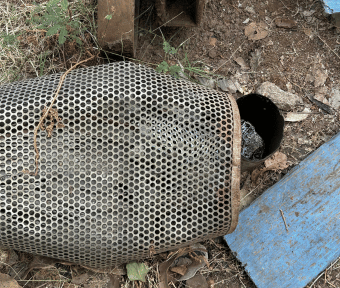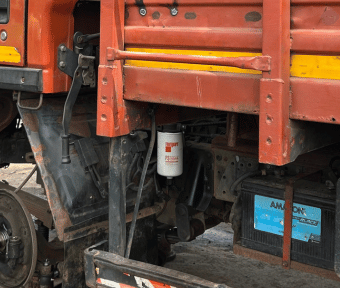Industry | 19 Dec 2024
Selecting the right industrial filter is a decision that carries significant weight. The proper filter ensures the smooth operation, longevity, and safety of your equipment. On the other hand, a poor choice can result in costly repairs, downtime, and diminished performance. Filters, especially for heavy-duty applications, must be tailored to specific operational demands and environmental conditions.
To help you make an informed decision, this guide highlights key factors to consider when selecting an industrial filter, ensuring that it meets your requirements and optimizes your equipment’s performance.
1. Understand Your Application Requirements
Before selecting a filter, it’s crucial to understand the exact application it will be used for. Are you filtering air, oil, fuel, or hydraulic fluids? What types of contaminants, such as dust, moisture, particulates, or chemicals—are you removing? For example, in an environment where heavy equipment is used, the air might be filled with dust and debris, making it vital to use a highly efficient air filter. In contrast, fuel systems demand filters that can capture microscopic particles and prevent damage to sensitive engine components. Knowing the specific contaminants your equipment is exposed to will allow you to choose a filter that addresses the exact challenges of your application.
2. Know the Filtration Efficiency
Filtration efficiency refers to a filter’s ability to capture contaminants, usually measured by the percentage of particles it can remove at a given size. For example, air filters for industrial engines often have a MERV (Minimum Efficiency Reporting Value) rating, while fuel filters might list their efficiency at removing contaminants as small as a few microns. Higher filtration efficiency means cleaner air, oil, or fuel, but it may also come with a higher cost.
Choosing the appropriate level of efficiency for your system ensures that contaminants are filtered out effectively, without compromising performance.
3. Consider Flow Rate and Pressure Compatibility
For any industrial application, it’s essential that the filter’s flow rate matches your equipment’s needs. A filter that impedes the flow too much can cause pressure drops, affecting the efficiency and performance of your machinery. Flow rate specifications are usually provided by the equipment manufacturer, and it’s critical to choose a filter that aligns with those guidelines. Filters that allow for smooth, uninterrupted flow will keep your equipment operating at the best level of performance, avoiding issues like overheating or strain on the engine.
4. Check Material Compatibility
Not all filters are built from the same materials, and the substance being filtered must not degrade the filter media. For instance, stainless steel filters are commonly used in high-temperature applications, while paper or synthetic media might be better suited for lower temperatures or less abrasive fluids. Ensuring the compatibility of the filter material with your operational environment will help prevent premature failure and the risk of damage to both the filter and your equipment.
5. Environmental Conditions
Environmental factors, such as extreme temperatures, humidity, or corrosive elements, must be taken into account. Equipment exposed to harsh environments needs filters designed to endure these conditions. For example, air filters used in environments with high humidity or rain exposure must be able to protect against moisture ingress, while filters for high-temperature systems, such as in heavy machinery, need to maintain functionality under heat stress. Choosing a filter that withstands your environmental conditions will extend its lifespan and improve overall equipment reliability.
6. Filter Type and Technology
Filters vary by type and technology, and it’s important to select the one that best suits your application:
- Mechanical Filters: Capture contaminants via a physical barrier.
- Adsorption Filters: Use materials like activated carbon to capture impurities.
- Magnetic Filters: Remove metallic particles from fluids.
The right filter technology will depend on the contaminants being filtered. Advanced filter technologies, such as those using synthetic materials or hybrid media, often provide longer-lasting performance and increased filtration efficiency.
7. Maintenance and Longevity
The longevity of a filter, as well as its ease of maintenance, are important considerations. Some filters require frequent cleaning or replacement, while others may offer extended service intervals. High-quality filters are often designed to last longer, reducing downtime and maintenance costs. Understanding the expected lifespan of the filter and its maintenance needs will help in planning your operational schedules, and minimizing unexpected breakdowns.
8. Brand and Quality
Selecting a filter from a trusted and reputable brand is essential. High-quality brands, such as Fleetguard Filters Private Limited (FFPL), known for their rigorous testing and product innovation, ensure that the filters are built to the highest standards. Inferior, cheaper alternatives may seem attractive at first but can lead to increased maintenance costs, equipment damage, and downtime.
9. Regulatory Compliance
Ensuring that your filter complies with relevant regulatory standards is critical. Depending on the industry and region, there may be specific requirements for filtration systems to adhere to ISO, NABL, or other international standards. Filters that comply with these standards not only ensure optimal performance but also help to avoid legal or operational issues down the line.
10. Cost-Effectiveness
While the initial price of the filter is important, the total cost of ownership is what truly matters. A more expensive, high-quality filter might have a higher upfront cost but could save money in the long term by preventing equipment damage, reducing downtime, and requiring fewer replacements. Weigh the long-term benefits of investing in a superior filter against the risks of using cheaper, low-quality alternatives.
Conclusion
Choosing the right industrial filter for your equipment is a decision that involves multiple considerations as mentioned above. A well-chosen filter can drastically improve the performance, reliability, and longevity of your equipment, helping you avoid unnecessary maintenance costs and downtime.
At Fleetguard Filters Private Limited (FFPL), we offer industry-leading filtration solutions that cater to the specific needs of on & off-highway applications. From air and fuel filtration to hydraulic and lube filtration, our products ensure the highest level of efficiency, reliability, and performance.
For more information on how our filtration solutions can enhance the performance and lifespan of your equipment, contact us at http://www.fleetguard-filtrum.com.








